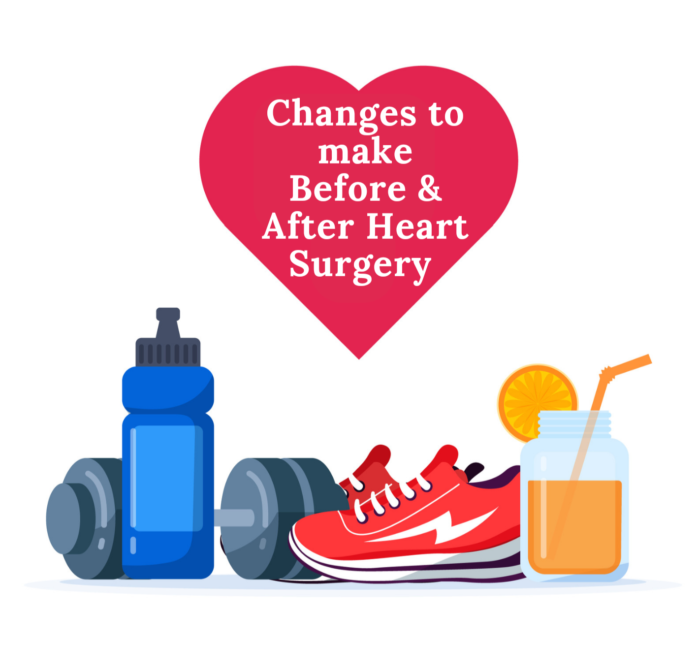After getting heart surgery to remove blockages or other ailments, post-surgical care and changes in lifestyle become crucial. While the pre-surgical preparation helps the patients to be ready for the operation, post-surgery is where the recovery and return to normal depend. Although no two patients bear the same issues and experiences, having some general information is critical to fasten the recovery procedure.
Heart diseases have been spreading fast, with a high number of deaths among adults pertaining to this problem. Our lifestyle has worsened with several other factors affecting our heart health. That is why the demand for heart bypass surgery, heart transplant, or other repair and replacement surgeries has risen considerably. If you have planned in the future, start making these changes in your lifestyle, diet, and more today so that things go smoothly throughout.
Pre-Surgery Care And Modifications
Before you begin your wellness journey with heart surgery, stop or modify the following things:
1. Quit smoking and drinking
Once you discover that you need heart surgery, give up your smoking and drinking habits. If you’re an addict, look for treatments, nicotine patches, etc., so that your addiction doesn’t trouble your heart health. Both smoking and drinking are leading causes of heart disease. Therefore, staying away from these lets the surgery go well and enhances your body’s ability to heal.
2. Control over blood sugars
If you are diabetic, this point is for you. Ensure you maintain your blood sugar levels in control. High blood sugar interferes with the healing process and causes several limitations during and post-surgery.
3. Stay well-nourished
It’s normal to have physical and emotional stress when you know you are going to get surgery. This stress can cause you to eat less or lose your appetite. In such crucial times, you should not compromise your nourishment and diet. Ensure to have a healthy, balanced, and optimal diet before and after the surgery. This will ensure your body gets the necessary nutrients- vitamins, minerals, iron, protein, etc., in an accurate balance to heal.
4. Sleep well
Do not lose your sleep over the stress of heart surgery. Sleeping well recharges your body and relaxes the muscles so that they can work well the next day. Consider this point before and after the surgery, too, as healing will require you to maintain a schedule and relax. Not getting adequate sleep can lead to diseases like high blood pressure, cholesterol, diabetes, depression, etc. It can cause severe problems during and after surgery.
Post-surgery care and changes to make
After your heart surgery finishes, the recovery procedure varies for each individual. The general time taken for recovery is anywhere between one to three months. How you care for yourself and whether you make the following changes determines the healing speed. Therefore, consider applying the following points in your life to ensure a happy and healthy life:
1. No heavy lifting
If your normal routine includes lifting heavy things, do not return to this routine immediately after surgery. Since the incision is fresh, you must stay away from heavy lifting until the wound recovers. Carrying heavy weight can put pressure on your sternum, which interferes with healing. So stay away from anything heavier than ten pounds for at least six weeks.
2. Hygiene practices
After surgery, maintaining hygiene can be challenging because you cannot soak yourself completely. However, maintain cleanliness and avoid hot water. You should wash the incision gently with soap and water. Also, maintain your oral hygiene well by brushing and cleaning your mouth a minimum of two times a day.
3. Clothing changes
Avoid wearing tight clothes after surgery for a while. You need to give the wound the necessary space to heal. So, prefer wearing loose clothes that are comfortable and don’t put undue pressure on the incision.
4. Do not drive
After surgery, it’s best to avoid driving for a little while. You can ride as a passenger, but avoid going cycling, motorbiking, etc., for at least six weeks. Your movements need to be limited and slow to let the breast bone heal completely. Even if you have to travel for long hours, ensure to take rest in between and get out of the car every two hours to walk for a few minutes.
5. Dietary changes
Your diet needs to transform completely, especially if you were feeding on junk and unhealthy items before surgery. A low-fat, no-added salt diet is recommended post-discharge. Try to have less than 30 percent of your calories from fat, consume less saturated fat, and limit your cholesterol levels to maintain a healthy body weight. If you’re losing weight fast, slow your pace and add foods so that your healing doesn’t get restricted.
6. Undergo cardiac rehabilitation
People undergoing bypass surgeries, valve replacement, etc., can undergo cardiac rehabilitation to feel well again. The team of physicians, nurses, exercise physiologists, and nutritionists will be there to assist you through the wellness program that fits your needs. It happens in four stages:
- The first phase begins in the hospital, where you exercise lightly under supervision. In this stage, you can gain additional education about the risk factors, diet, medicines, etc.
- The second stage looks after educational sessions and topics.
- Phase three continues the second stage after the patient gets discharged and looks after their well-being.
- The last stage emphasises improving and making changes in the lifestyle.
Bottom Line
Ensure to follow the recommendations made by your doctor to lead a healthy and happy life. Stress less and return to your normal life without complications.
Dr Khullar blog link
Blog Interlink for the website: https://lifetrixcorner.com/heterotopic-heart-transplantation-causes-symptoms-success-rate/














